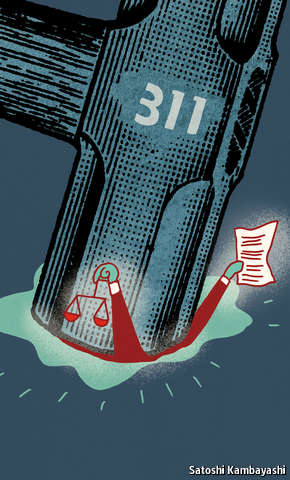NO NUMBER strikes fear into bankers’ hearts like “311”. That is the section of America’s Patriot Act of 2001 that gives the Treasury sweeping powers to act against those who facilitate financial crime, anywhere in the world, by labelling them a “primary money-laundering concern”. For firms badly behaved or unlucky enough to be targeted, a 311 designation is more often than not a death sentence.
The latest use of the power, in March, was against Banca Privada d’Andorra, a small money-manager based in the mountainous financial haven nestled between France and Spain. The move in effect shut the bank and its subsidiaries out of America’s financial system, preventing them from concluding any transactions denominated in dollars—an essential function for almost any bank. BPA’s Spanish unit has since been liquidated. The parent has been placed under the control of the Andorran authorities.
FinCEN, the arm of Treasury that handed out the black spot, accuses the bank of aiding money-launderers from China, Russia and Venezuela. It alleges that high-level managers knowingly facilitated untoward transactions, as well as €20m ($22m) of cash payments for a Chinese client linked to a criminal group engaged in human trafficking. The bank’s chief executive is in custody in Andorra.
BPA’s controlling shareholders, the Cierco family, are pushing back. They admit that they are not directly involved in the bank’s management, and cannot be sure there was no wrongdoing. But the instances of alleged laundering highlighted by FinCEN are generally several years old, they point out; in one case the bank was forced by an Andorran court to release funds from an account the bank had frozen. Moreover, BPA had undergone regular anti-money-laundering audits by KPMG and Deloitte since 2003 and had, as far as the family is aware, acted on the auditors’ recommendations. They question whether the American authorities took sufficient account of the impact of their action on the vast bulk of the bank—which, they claim, had no part in the alleged transgressions.
Regardless of who is right in this case, there are several reasons to question the use of 311. FinCEN does not use this nuclear option often: in 13 years it has been dropped on just over a dozen financial firms and four countries (it can be applied to an entire jurisdiction if the authorities are deemed to be complicit in the misconduct). When it does, the target is generally small or strategically unimportant. “They are cracking small nuts with a giant sledgehammer,” says a lawyer who has worked on one of the cases.

Some see double standards in this. It is striking that no 311 measures have been taken against banks in strategically significant Middle Eastern countries where money-laundering is a big concern, such as the United Arab Emirates, or against any banks from Western countries, including America itself, that have been caught facilitating money-laundering on a large scale or operating with woefully inadequate controls, such as Wachovia and HSBC. A lawyer who alerted American officials to a big money-laundering scheme in Bahrain and Saudi Arabia says they showed no interest. America applies 311s “in a political way”, says Jason Sharman, an expert in financial crime at Australia’s Griffith University, even if some or all of the recipients have indeed done what they are accused of.
Another alarming feature of 311s is that there is no requirement to make detailed evidence public, or even available to a court, to justify the action. It is an administrative procedure, not a judicial one. Only the Treasury knows how much evidence it has, and how reliable it is. Moreover, there is scant recourse for those targeted. Challenges can be heard by a federal court, but the bank has to show that the action was “arbitrary and capricious”, which is especially hard to prove given the secrecy of the process.
If the Treasury is shown to have made a mistake in designating a bank, or changes its mind for other reasons, it is almost impossible to repair the damage. Several targets have succumbed right away. Even those that have had their 311 lifted struggle to be rehabilitated.
Banco Delta Asia, a small outfit based in Macau, was hit with a 311 in 2005 on suspicion of helping North Korea evade sanctions. Other American government departments objected, fearing the move would undermine talks on North Korea’s nuclear programme. But even though the Treasury revoked the designation, other banks still refused to do business with Banco Delta Asia. The measure “had unleashed the private sector to isolate rogue financial behaviour—like antibodies in the international financial system, rejecting the virus of North Korean contact”, says Juan Zarate, a former official, in his book, “Treasury’s War”. The Federal Reserve had to step in to help return depositors’ funds. It will come as small consolation to BPA’s owners that Banco Delta Asia is still in business and has challenged the 311 procedure in an American court.


Sorry, comments are closed on this post.